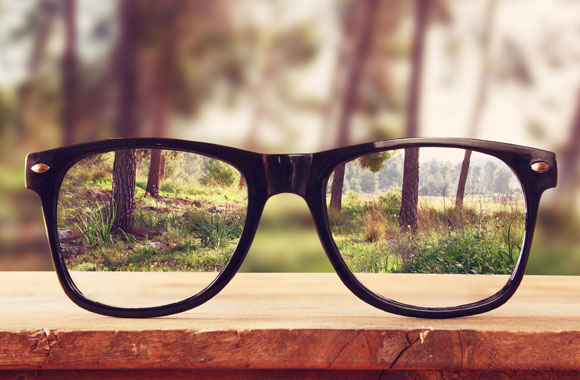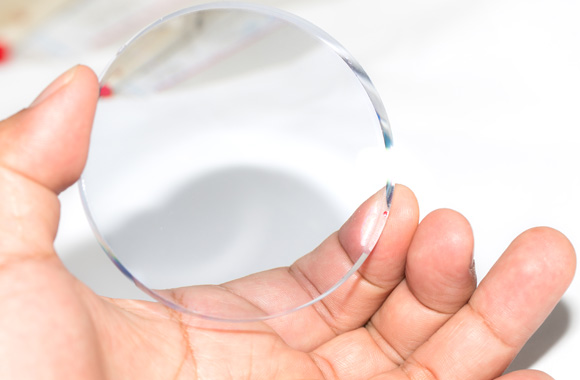Choosing the right Lenses for your glasses
Most people spend a lot of time choosing the frames for their glasses because of the choices available. However, very few realize that they also have a wide range of lenses available to them that offer protection for their eyes and give them the clearest and sharpest vision.
While selecting frames is very important to ensure comfort and look but choosing the lenses that are right for your vision, lifestyle and needs also requires time and consideration.
What lenses should you choose?
Your eyes and eyeglasses must work together to create the clearest vision in a comfortable way each and every day. This is why it’s important to choose the lenses that are best suited for you. The lenses of your glasses aim to correct, protect and enhance your vision. Here are some of the lenses options available to you:
Lenses that correct your vision:
- Single vision lenses are the most common lenses used to correct your vision. These lenses are tailored-made to match your prescription and correct eye conditions such as myopia, hyperopia and astigmatism.
- Both bifocals and progressive lenses are made to correct the vision of people (usually over 40 years old) suffering from presbyopia. The difference is that bifocals only help you see properly far and close-up while progressive lenses (such as Varilux) correct your vision at all distances.
- Computer glasses with an addition, like Eyezen, not only protect your vision in front of digital screens, they also help your vision focus when switching from one screen to another, such as from your computer to your phone.
Lenses that protect your eyes:
To protect your eyes, special coatings are added to the lenses of your eyeglasses. All of the options below can be used together to ensure your eyeglasses provides you with the best vision for your needs and lifestyle:
- Photochromic lenses are light-sensitive lenses that adapt to varying degrees of brightness and filter UV rays.
- Anti-glare lenses protect your eyes against bright lights and are great for people who drive regularly or for those who spend some time outdoors.
- Blue light protection lenses filters harmful light that comes from the sun, televisions, computer screens and cell phones.
- UV protection lenses are able to block ultraviolet rays.
Enhancing your vision through your lenses:
The lenses below have other protective coatings that give you clear and sharp vision by keeping your eyeglasses clean and comfortable at all times and match your tastes, comfort and activity level.
- Anti-scratch lenses help protect your lenses from scratches through a sturdy coating on your lenses. This helps your glasses last longer and maintains clearer vision.
- Anti-smudge lenses contain a special layer or coating that stops smudges and fingerprints from staying on your lenses.
- Anti-dust lenses use a coating on which dirt and dust does not stick leaving your lenses clean for longer.
- Water-repellent lenses ensure that water slides right off your lenses so that rain or condensation does not block your vision.
- High index lenses are thin and light lenses that are able to change the direction in which light enters the eye. These are usually offered for higher prescriptions.
Whatever your needs, it is worth your time to consider all the available options. It is important to know that you do not have to choose either or any of these lenses, all these options can be combined to give you the best vision specific to your needs.
If you’re still insure, you can speak to an optician, who can recommend options that suit your lifestyle, age and prescriptive needs.
How to Choose the right lenses?
Here are some helpful tips for you to choose the right lenses for your glasses to make your decision easier or at least make sure you make the best choice.
Everyone has differing needs when it comes to eyeglasses. Be it fashion or functional needs, the choices are many. So before selecting your glasses you need to consider a few factors when making your decision. Here are some questions you should ask yourself before deciding:
Do you have trouble seeing things up close or far away?
Short sightedness (myopia) or farsightedness (hyperopia) are common eye conditions that can easily be corrected through single vision prescription lenses. If you seem to have trouble seeing objects that are near and far, you likely need progressive lenses.
Are you having trouble reading?
If you are over 40, this is a common symptom of presbyopia, which may require progressive lenses.
Do you use the computer a lot or watch a lot of TV?
Computer glasses can prevent eye strain and over exposure to blue light. These lenses are perfect if you spend a lot of time in front of digital screens.
Are you an outdoors person?
UV lenses can be useful in protecting your eyes from over exposure to harmful UV light. In addition, photochromic or adaptive lenses ensure comfortable vision both indoors and outdoors.
Do you play a lot of sports?
Anti-scratch, anti-smudge, anti-dust, anti-fog or even water-repellent lens coatings on your glasses can help you enjoy your active lifestyle to the fullest.
Do you drive at night?
Anti-glare lenses can prevent accidents by providing crystal clear vision throughout your ride.
There are many more questions you should ask yourself, but these should provide you with a good starting point when it comes to choosing the lenses that suit you best. Make sure you spend enough time discussing these options with your eye specialist.
Need help choosing your lenses?
Visit your nearest optical store for advice and recommendation




